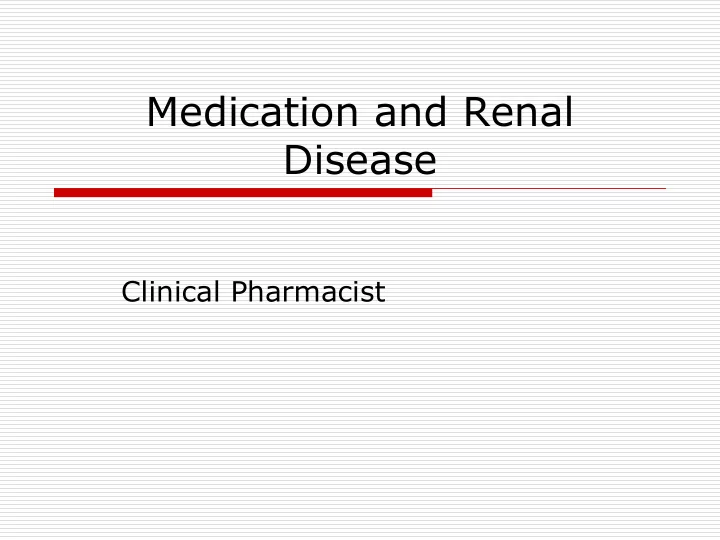

Medication and Renal Disease Clinical Pharmacist
Introduction Role of the kidney Blood pressure Bone Disease Anaemia associated with impaired kidney Summary
The Role of the Kidney Filter blood Excretion of waste products Help control blood pressure Regulate water and electrolyte balance Help keep bones healthy Help make red blood cells
Blood Pressure (BP) Kidney helps control BP High BP can cause renal impairment Renal impairment can cause high BP Important to Control BP Controlling BP can delay dialysis
Blood pressure targets Pre-dialysis 130/80 125/75 (proteinuric) Haemodialysis Before - 140/90 After - < 130/80
Treatment of high blood pressure Reduce the amount of water in the Water tablets Vasodilators Dilate blood vessels → reduce BP Beta-blockers Make heart beat more efficiently Reduce heart rate → reduce BP
Fluid Balance Kidney removes excess water Too much fluid Over load → ankle swelling Too little fluid Dehydration
Treatment of fluid overload Non-dialysis patients Diuretics (water tablets) May require dialysis Dialysis patients Drink less Water tablets don’t work Dialysis
Renal Bone Disease Kidney helps keep bones healthy Kidney impairment → bone disease soft bones Causes High Phosphate Low Calcium Low Vitamin D
Treatment of Renal Bone Disease Low High Low Calcium Phosphate Vitamin D Calcium Diet Needed to absorb Calcium Supplements Control Dialysis Phosphate Vitamin D fluid binders Supplements Vitamin D
Anaemia Kidney helps make red blood cells Kidney makes Erythropoietin (EPO) EPO stimulates bone marrow make red blood cells Kidney impairment – No EPO Treatment – EPO injection
Need iron stores to make red blood cells Kidney disease – Low iron stores Treatment Iron tablets Iron injection
Hepatitis vaccination Health and safety Frequent hospital visit Hep B vaccine Vaccine Given as 3 or 4 injections before starting dialysis
Other issues Leg Cramps On dialysis or at night Quinine Sulphate Restless legs Clonazepam
Pain killers and renal impairment Safe to use Avoid Paracetamol Non-steroidal anti- inflammatory drugs Co-codamol Ibuprofen Codeine* Diclofenac Co-Dydramol* Meloxicam Dihydrocodeine* Aspirin (300mg dose for pain) [75mg daily dose for * May cause drowsiness blood thinning is OK] May accelerate kidney failure
Ailment First choice Medication to treatment avoid Coughs and cold Simple linctus Decongestants Menthol Guaifenesin Steam inhalation Dextromethorphan Indigestion Preparations Preparations containing calcium containing sodium, (unless calcium is potassium or high) magnesium Diarrhoea No treatment Rehydration sachets 2 nd choice - Loperamide Hayfever Antihistamine Pseudoephedrine eyedrops Cetirizine Chlorphenamine
Summary Medication only prescribed if needed Important to take medication Information in presentation limited Further Information Nicholas Weaver (Pharmacist) 01603 – 287139 ‘Pharmacy helpline’ 01603 – 286286 Contact Renal Unit or Consultant
Recommend
More recommend